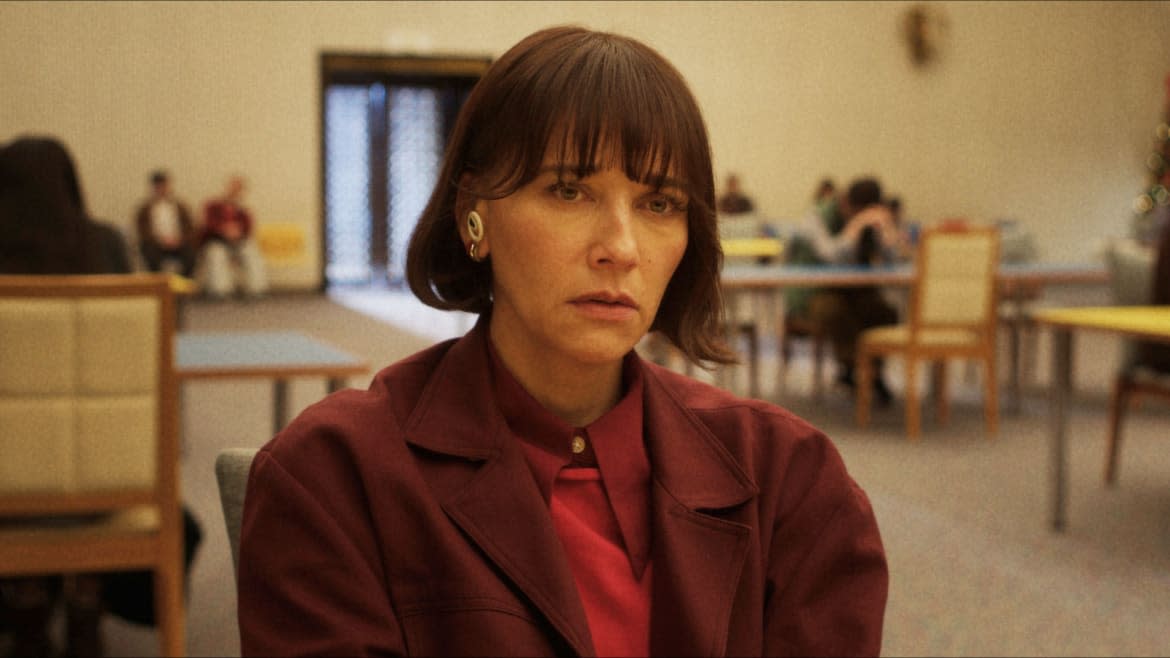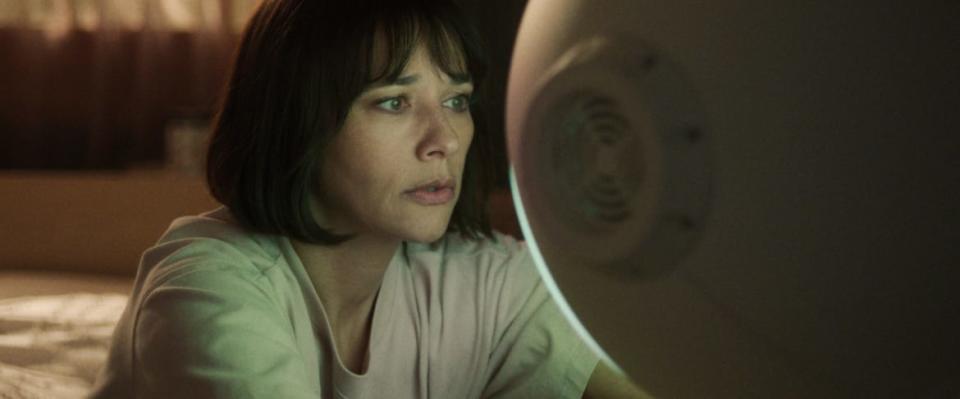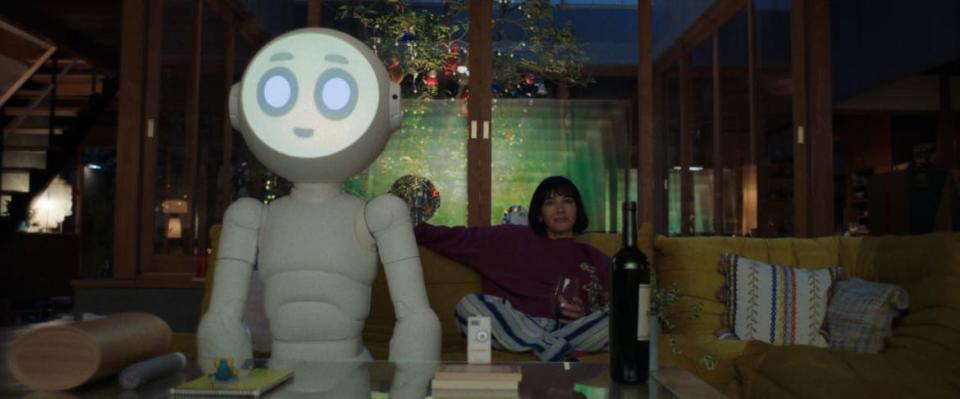Rashida Jones’ Bold New Show: Can an AI Robot Cure Our Loneliness?

Loneliness is a killer in Sunny, a 10-episode Apple TV+ series premiering July 10, in which the cure for alienation and unhappiness turns out to be a double-edged sword. An adaptation of Colin O'Sullivan’s novel The Dark Manual, Katie Robbins’ half-hour dramedy is a sci-fi mystery about the lengths people go to be alone and the devices they create to alleviate that condition. Though it doesn’t always hold together, its uniquely askew tone and charismatic AI title character ultimately make it a puzzle worth piecing together.
Sunny introduces us to Suzie (Rashida Jones) in the throes of the worst day of her life. At a table beside her mother-in-law Noriko (Judy Ongg), she’s briefed by a Japanese airline official about the plane crash that has taken the life of her husband Masa (Hidetoshi Nishijima) and son Zen. An American expat who lives in Kyoto with her family, Suzie understands this woman because of an earpiece (connected wirelessly to a handheld device) that translates her comments into English. Behind them, robots move to and fro, performing menial duties as Suzie is questioned about her spouse, who worked at a company called ImaTech as a designer of high-tech consumer refrigerators.

Back at their hotel, Suzie is convinced by Noriko to attend a ceremony where survivors are supposed to ease their grief by crying—a process that involves calling their deceased loved ones’ cellphones to hear their voicemail messages (which will spark waterworks). Strangely, Masa’s phone rings off the hook, suggesting to Noriko that perhaps his body hasn’t been found because he’s not dead.
Suzie has no such hope, and retreats to her house to wallow in grief-stricken solitude. To her dismay, that doesn’t last long, because she’s visited by a man named Yuki Tanaka (Jun Kunimura) who’s brought her an ImaTech homebot named Sunny (voiced by Joanna Sotomura) that, he claims, was custom-built for her by her husband. Though she doesn’t understand why Masa was messing with domestic automatons (since he worked in appliances), she begrudgingly accepts it, only to promptly put it to sleep and store it in a closet.
There’s no escaping Sunny, however, who’s soon following her around and trying to cheer her up. More puzzling is that, after deciding at the last minute to attend her husband’s company Christmas party, she sneaks into Masa’s restricted basement lab and finds a series of rooms where experiments (with homebots?) were conducted, and one boasts bloody tread marks.

Sunny’s schizo opening has already implied that a robo-murder took place in this locale, yet the nature of that calamity remains enigmatic for much of the series’ first season. To cope with this discovery, Suzie retreats to the bar where she first met Masa. Over whiskey, she strikes up a rapport with bartender Mixxy (Annie the Clumsy), who tells her there’s a secret hacker guide known as the Dark Manual that lets owners make homebots do whatever they want (including, in Mixxy’s case, sexual acts). This is unnerving to Suzie, and sounds potentially related to the headline-making death of Councilman Ito (Ayumi Tanida), who was recently crushed at home by his bot.
While Suzie initially tries to abandon Sunny, she has a change of heart after the robot performs a hand gesture that Masa used to do. This indicates that it might house secrets concerning Masa’s fatal fate, and additional sleuthing indicates that the Dark Manual is the key to unlocking them. Thus, Suzie teams with Mixxy and Sunny on a quest to track down the hacker code and, with it, answers about Zen and Masa. Of particular interest is a symbol of a wolf chasing its tail that seems to be central to accessing the Dark Manual, and which was an illustration that Masa drew as a child. These clues are the catalyst for the makeshift trio’s adventure, which is complicated by the involvement of a yakuza gang led by Hime (You), whose bigwig dad is in failing health, and who’s in a power struggle with her cousin for control of the criminal outfit.
Sunny borrows bits and pieces from various TV shows and movies (including Minority Report, via scenes of Suzie watching holographic videos of her deceased loved ones), yet it has its own distinctive personality. Much of that is due to Sunny herself, a cute white bot with a giant round face screen that displays cartoonish expressions. Sunny is programmed to be an intensely cheery and helpful companion, so when she breaks from that mold and says something out of character, it proves a jarring and intriguing hint about what’s really going on. Those moments are a tad too infrequent; the proceedings would have benefited from even more amusingly unexpected behavior on the robot’s part. Still, she’s a compelling creation, and her rapport with Jones has a prickliness that contributes to the drama’s simmering tension.

For much of Sunny, Suzie is stymied not merely by circumstances but also by her dedication to being alone—a tendency that, it’s revealed, predates the plane crash. Her loneliness isn’t just a character trait; it’s the heart of Robbins’ show. That becomes apparent as Suzie digs deeper into Masa’s past as an engineer who was inspired to create this new line of homebots by his own years-long stint in depressed isolation. The series nicely balances its tender emotional concerns with its more suspenseful action, and if Suzie and Mixxy’s faint romantic sparks never ignite and its yakuza-centric material feels a tad underwritten—especially in light of the stellar underworld intrigue of Tokyo Vice—it compensates with sharp caustic humor.
Sunny gets a bit contrived during its final passages, especially when it comes to Noriko’s role in helping Suzie and company extricate themselves from trouble, and it’s surprising—in a somewhat unsatisfying way—that rather than wrapping up in self-contained fashion, the show ends on a cliffhanger-ish note that sets up a new narrative phase. Given that its lively compactness is part of its charm, it’s not clear that this story can sustain multiple seasons. Nonetheless, that’s a worry for another day—and doesn’t negate the jaunty appeal of this maiden outing.
Get the Daily Beast's biggest scoops and scandals delivered right to your inbox. Sign up now.
Stay informed and gain unlimited access to the Daily Beast's unmatched reporting. Subscribe now.

 Yahoo News
Yahoo News 
